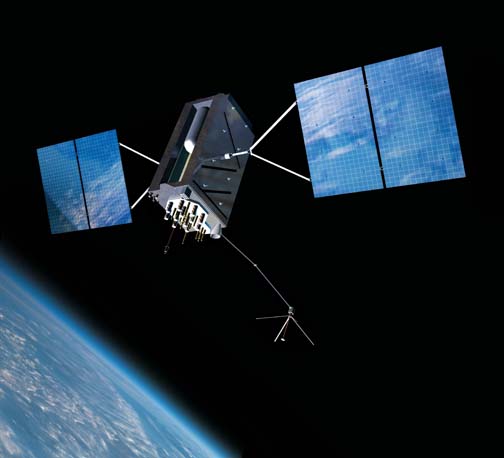 Artist’s illustration of GPS III. Lockheed Martin image
Artist’s illustration of GPS III. Lockheed Martin imageThe Aerospace Corporation has completed acceptance testing on the GPS III Bus Real Time Simulator (BRTS) from the Lockheed Martin–led team developing the next-generation satellite program, keeping the initiative ahead of schedule.
The BRTS is a specialized piece of test equipment designed to reduce risk and ensure overall mission success for the lifecycle of the GPS III program. The simulator will enable Aerospace Corporation to independently validate GPS III bus flight software for the U.S. Air Force.
The Aerospace Corporation has completed acceptance testing on the GPS III Bus Real Time Simulator (BRTS) from the Lockheed Martin–led team developing the next-generation satellite program, keeping the initiative ahead of schedule.
The BRTS is a specialized piece of test equipment designed to reduce risk and ensure overall mission success for the lifecycle of the GPS III program. The simulator will enable Aerospace Corporation to independently validate GPS III bus flight software for the U.S. Air Force.
Lockheed Martin shipped the BRTS from its Newtown, Pennsylvania, facility to Aerospace’s, El Segundo, California, on September 10. Acceptance testing for the BRTS was completed seven days after delivery.
Throughout GPS III development, Lockheed Martin will deliver several bus flight software increments to Aerospace Corporation, where engineers will use the BRTS to test and confirm the satellite’s guidance and navigation functions and ensure the flight software will meet program requirements.
Dave Podlesney, Lockheed Martin’s GPS III program director, said of this first GPS III contract deliverable, “The Bus Real Time Simulator will play a critical role in providing mission assurance and the delivery ahead of schedule demonstrates our continued positive momentum and close partnership with the entire government/industry GPS III team.”
The Lockheed Martin team recently completed the GPS III critical design review two months ahead of schedule and is now proceeding rapidly in the program’s manufacturing phase. The first launch of a GPS III satellite, which will provide significant improvements over current satellites, is scheduled for 2014 from Cape Canaveral Air Force Station, Florida.



![GPS Satellite Launch Schedule on “Indefinite” Hold [05] CGSIC GPS Status 15 Sept 5.jpg](https://insidegnss.com/wp-content/uploads/2018/01/[05] CGSIC GPS Status 15 Sept 5.jpg)
